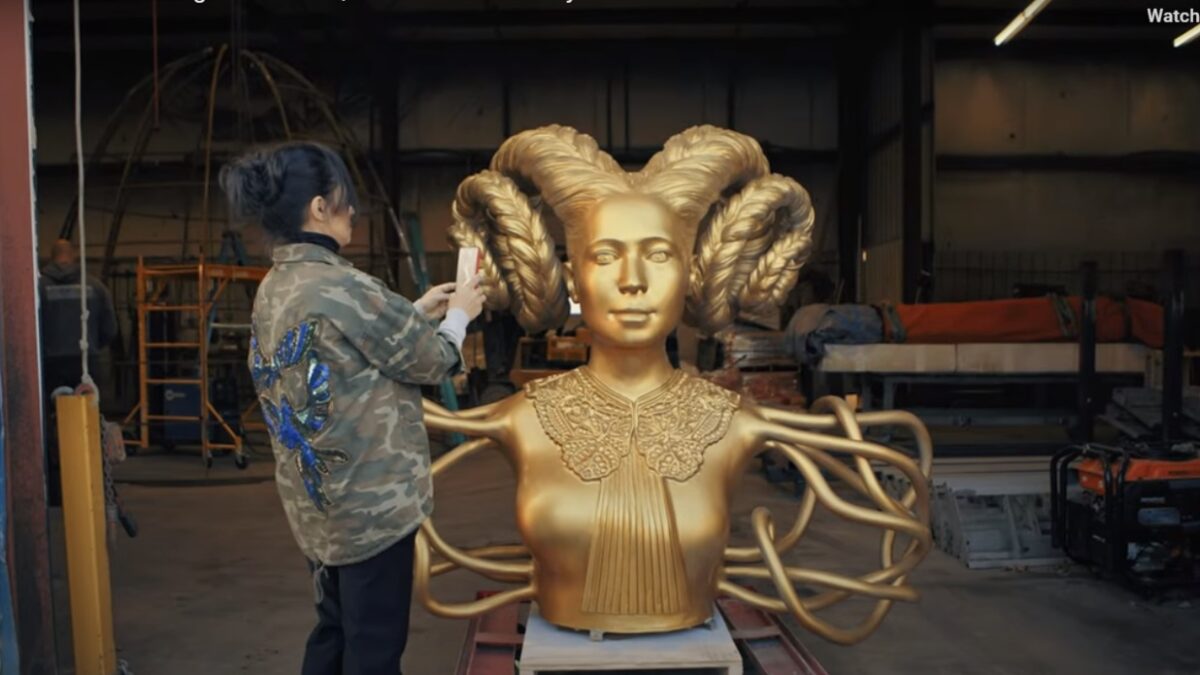This coming week, the University of Houston will be displaying the sculpture “Witness,” a massive (18 feet by 13 feet by 13 feet) nude woman with braids shaped like rams’ horns, tentacles for arms, and a large hoop skirt marked with Arabic writing in stained glass.
Although the description on the UH website claims, “The large-scale sculpture Witness (2023) is a grand allegorical female figure that allows for multiple meanings and possibilities,” the group Texas Right to Life has deemed it “satanic imagery to honor abortion and memorialize the late Supreme Court Justice Ruth Bader Ginsburg.” For her part, the artist Shahzia Sikander affirmed this interpretation in an official response, explaining that her work was intended to express justice for nonwhite women, protest the reversal of Roe v. Wade, and celebrate the pro-abortion Ginsburg.
On a different occasion, Sikander has said, “I have always had an affinity for the anti-monument within my practice.” Thus, to properly judge “Witness,” one must see it as an “anti-monument,” not a monument.
But what is an anti-monument? Presumably, it’s the opposite of a monument, which is an object that embodies the values or spirit of a particular community and usually abides by the highest aesthetic and moral standards. So while a monument will usually bring a community together by its beauty, goodness, and truth, an anti-monument divides a community through its ugliness, evil, and falsehood.
If so, then “Witness” definitely succeeds in being an anti-monument. Even without knowing the artist’s inspiration, one can observe that the sculpture is weird, grotesque, and offensive. It mars the female form with beastly appendages, satanic hairstyles, and a bizarre metallic bubble that says “Havah,” an Urdu combination of the words “air” and “Eve.” Its target audience is not the public, especially the Texan public, nor is it even women or nonwhite women; it is angry feminists who hate Western culture and Christian values.
Sikander previously had a similar sculpture displayed atop a New York courthouse alongside Moses and Zoroaster.
The Goal Is to Mock Christianity
Like all satanic imagery and ideology, “Witness” is mainly about mockery and spite. Sikander and her fans may serve up some verbal froth about empowerment or justice for nonwhite women, but they know quite well that no one is going to get that from this statue. They want to troll white Christians with a visual monstrosity and then call them hypocrites when they protest.
The situation is no different than Satanist groups pushing After-School Satan Club. While the club’s spokesmen claim it’s all about encouraging self-confidence, rationality, and the scientific method, everyone understands that this is really about mocking Christians. Why else would a group name itself after Satan, the devil who hates God and wants to punish His creation?
The same could be asked of UH’s new statue. If the goal is to celebrate reproductive rights, marginalized women, or RBG, why do this with a thing that looks like it comes from the sci-fi horror movie “Annihilation” instead of something visually appealing and actually symbolic of those progressive ideas? Because the goal is to make people uncomfortable and angry.
A Sign of the Times
Erecting an anti-monument may end up being even more harmful and demoralizing than the left’s usual habit of toppling existing monuments. As it stands, UH will display something that reminds innocent bystanders that their culture, legacy, and access to beauty have essentially vanished. They now inhabit a world that has lost the spiritual and moral capacity to create a monument. Rather, its artists can only create anti-monuments, abominations that destroy their surroundings more effectively than even the worst graffiti.
Of course, it doesn’t have to be this way. The Texas Right to Life organization is completely justified in calling for the removal of the statue, and it’s significant that they do this through a formal process instead of brazen vandalism. The goal is to build and create, not ruin and destroy.
This is not simply a matter of settling cultural differences, but of having a shared culture to begin with. No matter where one stands on the issue (the right side or the wrong one), public art is not a trivial issue, and it’s crucial to act responsibly and from a place of love. True to its status as an anti-monument, “Witness” is an exquisite piece of anti-culture, something fit for private enjoyment or the landfill, nothing more.









